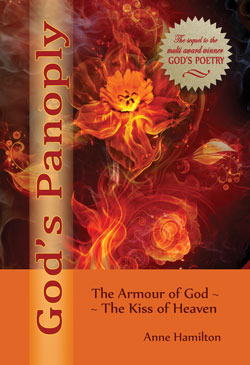Posted by Anne on Aug 5, 2013 in Writing | 4 comments
I got a lovely email today. I’d sent a sample copy of God’s Panoply to the director of a resource centre in the hope I’d get permission to put some advertising at an upcoming conference. He read the first chapters of the book just prior to this event. Here’s what he wrote:
I was in Townsville last weekend with Sandra and Peter at the Healing Shame seminar. On the Saturday the Holy Spirit led Sandra to invite women to repent for their mistreatment of men and this was responded too with a couple of ladies taking the pulpit and repenting and asking for forgiveness. Men were given the opportunity to respond and 4 did. I was one of them.
I had only had opportunity to read your book on the Wednesday before I flew to Townsville on the Thursday afternoon. I devoured the first chapter and loved it. As I approached the pulpit on Saturday, your book in hand, I explained you had just not long ago published it and sent it to me. I felt the need to repent, as a minister of the Gospel, for the suffering placed on women from the pulpit through the misuse and misinterpretation of scripture and read a few portions of the book about the real meaning of being the head and the heart Paul was writing from when talking about submission and the true meaning of lifting one another up and being a covenant defender.
read more
Posted by Anne on Jul 31, 2013 in Writing | 11 comments
I’m single. I always have been.
From time to time across the years, a well–meaning (invariably married) friend would warmly commend a book or a seminar on singleness to me.
Once upon a time, I’d act on the recommendation but after a while I learned better. Books and seminars tended to regard ‘singleness’ as that temporary state of being between two marriages. They had nothing for a girl twenty years, thirty years, forty years… and more… unmarried.
In the end, I couldn’t stand this kind of book. What, I asked, could someone who had been single for the eternity of five years after a divorce tell me about the topic?
Not long after beginning to write God’s Panoply, I realised that one of the sweeping themes in it was marriage. I was horrified. I mean: if I hated people telling me about singleness when the most they knew about it was a couple of years prior to a re–marriage, how could I dare to write about marriage?
I delayed when it came to the writing, talked to God, pleaded with Him, argued that He must have called a married person to write the same ideas… All I got by way of answer was: ‘No one can ever accuse you of having a hidden agenda.’
read more
Posted by Anne on Jul 8, 2013 in Naming, Writing | 13 comments
 I’d been looking for the ideal cover for my latest book, God’s Panoply—The Armour of God and the Kiss of Heaven, for over a year. I’d narrowed my options slowly, wanting to make sure my choice and God’s choice coincided.
I’d been looking for the ideal cover for my latest book, God’s Panoply—The Armour of God and the Kiss of Heaven, for over a year. I’d narrowed my options slowly, wanting to make sure my choice and God’s choice coincided.
Eventually I decided that the soft focus stock photograph of a mounted knight in armour that I’d been looking at for three months was the one. Imagine my horror when the day I got around to buying it (always a good option when trying to persuade my publisher) it had disappeared from the Dreamstime website. Not to worry. I’m sure I’d seen it on istockphoto, though a little more expensive. It was gone from there too!
Wait! There were other stock photo sites where I’d seen the same shot. All gone!
I was in shock. I’d been praying about the perfect cover for a year—and I felt like I’d been robbed. I looked at my secondary choices. None of them were anywhere near as good.
So I had a long anguished chat with God. Not long after, He directed me to a picture that, I have to say, was not my idea of panoply. It was a daffodil—nothing like armour. However the more I looked at pictures of shields and bucklers, swords and banners, the more I felt the Holy Spirit pulling me back to the daffodil. ‘But it doesn’t mean anything!’ I wailed. ‘At least the rose on God’s Poetry symbolises the essence of names. The whole rose-by-any-other-name question raised by Shakespeare as to whether a name has any effect on anyone.’
read more
Posted by Anne on Jun 13, 2013 in Naming, Reviews, Writing | 5 comments
It took me about five lessons to realise Hebrew language studies were not for me. The lecturer finally asked a question I could answer. It had to do with the first seven words of Genesis:
bereshit bara Elokim et hashamaim v’et haarets
He asked what the fourth word signified.
At last! Something I actually knew. I stuck up my hand.
The two-letter combination alef-tav in Genesis 1:1 is invariably untranslated. It occurs often throughout Scripture without any remark but nevertheless it has a profound meaning. The word is comprised of the first letter of the Hebrew alphabet, alef, and the last, tav. It’s the equivalent to the Greek combination of alpha and omega.
However, in Hebrew it’s more than ‘the first and the last’: alef-tav encompasses all 20 letters between these two and every combination of letter. In other words: every word that has ever existed or could possibly exist.
read more
Posted by Anne on Jun 8, 2013 in Writing | 2 comments
My mum swears I was born asking, ‘Why?’
I think she exaggerates. I don’t even remember asking ‘Why?’ until I was eleven years old and was under pressure to expand a review I’d written of Anne of Green Gables. Instead of the usual paragraph, the teacher wanted an entire page on why I’d liked it. I did some soul-searching and then asked myself, ‘So, Anne, why exactly do you like it?’
That’s influenced my reviewing ever since. If you check out my reviews at Goodreads, you’ll find I often write a lot, simply to try to articulate my liking (or disliking) for a book.
Nonetheless, my mother says it started earlier. I was relentless in my quest for answers as a toddler and would not be put off by half-hearted replies. Somewhere along the line, I learned that if you ask God seriously and are patient enough, He takes you seriously in turn and always gives answers.
read more
Posted by Anne on Mar 25, 2013 in Naming, Writing | 14 comments

Easter: to judge by the shops, it’s all about hot–cross buns, fluffy bunnies and chocolate eggs.
Jolly pagan stuff, huh? Especially those bunnies. Symbolic of an ancient fertility rite and the revivification of the earth at springtime, they just reek of goddess worship. It doesn’t matter whether you’re a Christian or not—one thing we’re agreed on: the bunny is an iconic pagan image.
About this time last year, I started to become excessively suspicious about this academic collectivism. In researching threshold covenants, it’s not possible to pass over the ultimate type: the Passover itself. That means returning to the original word—Pesach—and finding out what it means.
Now, scholars aren’t entirely sure about pesach. They think it means to leap, to spring, to hop, to pass over.
God leaping, springing or hopping isn’t an image that fits immediately and comfortably into my brainspace and I can see why the more dignified ‘pass over’ is the verb of choice.
read more
Posted by Anne on Feb 2, 2013 in Naming, Writing | 4 comments
During the conflict in Syria, refugees have been pouring into Wadi al–Nasara, the Valley of the Christians.
In the middle of my prayers for this nation in crisis, the word ‘nasara’ struck me as a very unusual name. It doesn’t look anything like the western word Christian. So what sense did it have for the Arabs?
Now Christians have been called by many names over the last two millennia. It’s a bit trendy to be a Christ–follower these days, rather than a Christian. A couple of decades ago, Jesus–freak was by no means a derogatory term.
The names change, even while the Lord remains the same. Even back in the first century, there was no standard terminology. Luke, for instance, uses seven different names in the Book of Acts:
- Saints
- Believers
- Disciples
- Brethren
- Followers of the Way
- Those being saved
- Christians
Still, I’ve got to admit I pricked up my ears at Nasara. In the book I’ve been working on most recently, God’s Panoply, the Hebrew word ’nasa takes prominent place. As soon as I heard of Wadi al–Nasara, I wondered whether there was any connection between the two words.
As it turns out, nasara is an Arabic word. It’s old. So old it’s used in the Quran, the Islamic holy book. Subsequent commentary on the passage which refers to Christians as nasara is exceedingly interesting. The expected word for Christians should be Masihiyyun (followers of the Messiah) but it’s not.
Rather, nasara is used 18 times in the Quran. By contrast, Christian is only used 3 times in the New Testament.
read more
Posted by Anne on Jan 1, 2013 in Writing | 12 comments
One evening in church a little while back, I got distracted while singing one of the choruses. My eyes happened to light on the final words of an unfamiliar hymn on the opposite page: And heav’n’s peace and perfect justice kissed a guilty world in love.
Hmm, I mused. The ‘suspicion’ switch turned on in my head.
If I’m not mistaken, I thought, those lyrics are a reference to Psalm 85:10. I immediately began to wonder about the age of the hymn. There was nothing helpful on the page except the composer’s name, William Rees, along with two verses:
Here is love, vast as the ocean,
Loving-kindness as the flood,
When the Prince of Life, our Ransom,
Shed for us His precious blood.
Who His love will not remember?
Who can cease to sing His praise?
He can never be forgotten,
Throughout heav’n’s eternal days.
On the mount of crucifixion,
Fountains opened deep and wide;
Through the floodgates of God’s mercy
Flowed a vast and gracious tide.
Grace and love, like mighty rivers,
Poured incessant from above,
And heav’n’s peace and perfect justice
Kissed a guilty world in love.
It looked old. But not that old. It lacked a telltale thee or thou. Still those apostrophes were hopeful signs.
read more
Posted by Anne on Aug 24, 2012 in Naming, Writing | 13 comments
My brother–in–law is a king.
True.
It happened this way: he was involved in aid work in the Philippines. Some villagers asked him to write to the government on their behalf. They wanted the land taken from them back. Privately he thought their chances were nil but he gave it his best shot anyway.
To his surprise the government agreed. The villagers were so delighted they decided to make him their king. My sister travelled with him for the ceremony and asked what it meant to become a ‘datu’. ‘Our datu is our king,’ she was told. ‘He can go to Buckingham Palace and eat cucumber sandwiches with the Queen of England.’ My brother–in–law has not tested the earnest conviction of his loyal subjects on this score, possibly put off by Wikipedia’s insistence a ‘datu’ is merely a petty tribal chief.
read more
Posted by Anne on Aug 14, 2012 in Naming, Writing | 19 comments
My garden has never been the same since the drought of three years ago. The flowers wilted and the rose bushes died and, although we’ve had a flood of rain since, I’ve never got around to replanting them.
One surprising survivor is a cluster of storm lilies that comes up every time there’s a sunshower. A soft blend of translucent cream and lilac, they are—unfortunately—rarely there more than a day. They epitomise to me the wonder of life in all its transience, fragility and beauty.
I have a serious addiction to wonder. It’s probably the reason I’ve never outgrown that child-like asking of, ‘Why?’ Sooner or later, that is the question which leads to a moment of spellbound awe. CS Lewis admitted to the pursuit of joy; for me, it’s wonder.
It was Martin Luther who said, ‘If you truly understood a grain of wheat, you would die of wonder.’
read more
Posted by Anne on Jul 26, 2012 in Writing | 25 comments
When my dad was diagnosed with cancer, he was keen to investigate both conventional and alternative medicine. As a consequence, he sent me off on his behalf to a course in ‘German New Medicine’.
The brainchild of oncologist, Dr Geerd Hamer, it looks upon cancer as a ‘disease of the soul’—and thus not only physical in nature but also psychological and spiritual.
The physical aspect looks back at a moment of trauma, usually a year or two in the past. The psychological component is about the words the person speaks over themselves at that moment of trauma. And the spiritual component of it looks at why those particular words were chosen and at long–term issues of forgiveness.
Ever since I did the course, I’ve got phonecalls from various people who know I attended, asking what the handbook suggests were the words that could initiate a particular disease. I’ve yet to have anyone disagree with what I’ve uncovered; in fact, mostly a dozen lightbulbs have gone on all at once for anyone who has asked.
Words.
According to Geerd Hamer, who looked at over 40 000 patients to formulate his theory, the words we speak over ourselves at a moment of trauma have immense power.
There is nothing new in the idea that words have power. In the first chapter of Genesis, God creates the heavens and the earth by the power of the spoken word.
read more
Posted by Anne on Jun 30, 2012 in Writing | 11 comments
I’ve always liked the writing of Os Guinness. He never shies away from the difficult questions. In Unspeakable he tackles the question of how a good God can permit atrocities to continue throughout history.
Towards the very end of the book, he relates the story of Philip Hallie. A Jewish boy from Chicago, he grew up in a world of arbitrary cruelty. After the Second World War, he left the army and studied philosophy, eventually to pursue a lifelong analysis of the nature of the Holocaust.
You are what you read.
Hallie’s major work was highly acclaimed but inevitably it drew him deeper into depression and violent, restless anger. After a frightening confrontation with his family one night, he went out in order to try to walk off his black mood. Arriving at his office, he sat down in despair. He realised he had become the very thing he had read about for so long: the face of cruelty was not only a Nazi doctor cutting off a Jewish boy’s toe or ear without anaesthesia, it was his own.
As he sat there, appalled, his eyes lighted on a bookshelf devoted to the French Resistance. Recalling that those stories of heroism always made him feel better, he went to the shelf and there discovered a small book he could not remember reading. He quickly realised why.
read more




